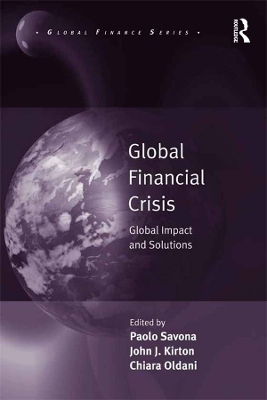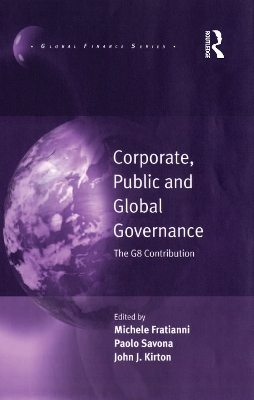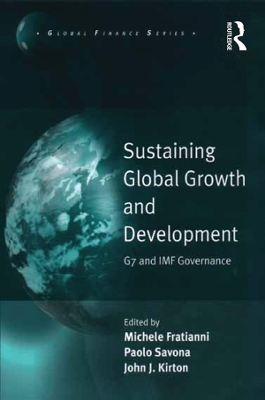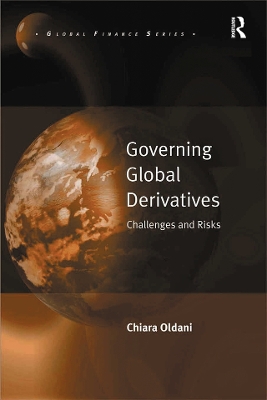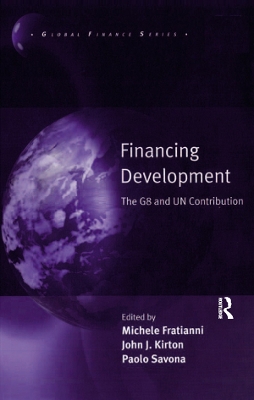Global Finance
5 total works
Out of the debate over the effectiveness of the policy responses to the 2008 global financial crisis as well as over the innovativeness of global governance comes this collection by leading academics and practitioners who explore the dynamics of economic crisis and impact. Edited by Paolo Savona, John J. Kirton, and Chiara Oldani Global Financial Crisis: Global Impact and Solutions examines the nature of the recent crisis, its consequences in major regions and countries, the innovations in the ideas, instruments and institutions that constitute national and regional policy responses, building on the G8's response at its L'Aquila Summit. Experts from Africa, North America, Asia and Europe examine the implications of those responses for international cooperation, coordination and institutional change in global economic governance, and identify ways to reform and even replace the architecture created in the mid 20th century in order to meet the global challenges of the 21st.
Corporate, Public and Global Governance
by Michele Fratianni and Paolo Savona
Published 1 April 2007
The intensifying pace of globalization has led to a questioning of the traditional approaches to governance at the corporate, national and international levels. The crash of the dot-com bubble and the outbreak of corporate accounting scandals in the United States, along with the debt burden of financial institutions in Japan and Europe, have led to demands for major reforms. Consequently, national governments are confronting stronger demands for new ways to regulate corporations to fulfil their social responsibilities and generate growth in a competitive world. This volume explores three central questions: what forms of corporate governance are most desirable for the globalizing world of the twenty-first century? What forms of public governance are most appropriate in this new age? And how well are the world's leading national governments pioneering the needed policies and practices? The book offers an analysis of the G8's role in assisting governments and corporations to work together to design and deliver a superior approach.
Sustaining Global Growth and Development
by Michele Fratianni and Paolo Savona
Published 1 April 2016
Sustaining Global Growth and Development focuses on the new challenges for sustaining growth in the twenty-first century and the role of the G7 and IMF in meeting these challenges amidst the new processes of regionalism now emerging. The volume has three central purposes: A* to assess how and how well the G7 has addressed its core 2002 agenda of sustaining global growth, reducing poverty in Africa, and combating terrorism and its financing A* to examine how the IMF has approached these issues, and related work of the G7 A* to explore how the G7, IMF and other international institutions are addressing global growth and development challenges in the context of the new processes of regionalism. Pressures such as currency consolidation in Asia and economic union in Africa are studied. This book builds on previous volumes in the series with a heavy focus on the World Bank, the regional development banks and the many other international institutions that work in the field of development.
Governing Global Derivatives analyzes the role of the most important financial innovation of the last two decades - financial derivatives - in a global dimension. The evolution of derivatives, especially Over the Counter (OTC), and the possibility of managing risks tailored to customers' needs, are the basic recipe for the success of derivatives. This book focuses on the role of derivatives from a macroeconomic point of view, considering how monetary theory and policy, fiscal policy and the growth process are affected. It fills a gap by rethinking the way financial markets are considered in the macroeconomy and the transmission mechanism of impulses.
The critical challenge of financing development and sustainability is a key focus for the world's international financial institutions, led by the International Monetary Fund, the World Bank, and, above all, the G8. This volume assesses the current practice and perspectives of the major developed world countries that dominate the boards of the IMF and the World Bank and comprise the G8. It looks at the prospects for meeting the Millennium Development Goals in the most impoverished region of Africa, the way trade and finance instruments can help, and how the challenges of energy security and climate change control will affect the results. This volume offers in-depth analysis of: * how the Millennium Development Goals are to be met * North-to-South resource transfers * the challenges of controlling climate control beyond Kyoto In sum, this volume provides a critical and creative examination of what the G8 governments, especially at and after the 2005 Gleneagles summit, have done and what they should do to promote development and sustainability.
